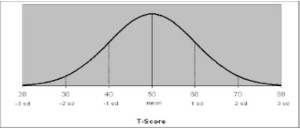What do T-Scores Mean on Test Reports?
T-Scores
T Scores are another method of describing a person’s performance, where a T Score of 50 is precisely average and standard deviations are 10 points. Average scores are in the range of 40 to 60. T-Scores are often used in behavior rating scales such as the BASC-2, the BRIEF, and the Brown ADD Scales. For most clinical measures on these scales, a high score (above 60) is reflective of modest difficulties and a score above 70 suggests more significant concerns. However, these interpretations vary amongst tests as each test uses their own classifications and ranges. For some tests scores, from 60-69 are considered “at-risk” and slightly atypical from the norm, whereas another test, eg. the Brown ADD Scales views these scores as clinically significant.
Most low scores on clinical scales (below 40) are not interpreted any differently from scores between 40-50, and do not suggest a particular strength, but merely suggest the absence of a problem. A T-score of 65 on a measure of hyperactivity suggests concerns, but a score of 50 or 30 is interpreted as an absence of concerns.
However, some T-scores may measure strengths, such as the Adaptive Scales on the BASC-2. In this case, a high score (above 60) is interpreted as a sign of strength and a low score (below 40) typically means an absence of that skill.
Visit the South County Child & Family Consultants website for more great articles!
